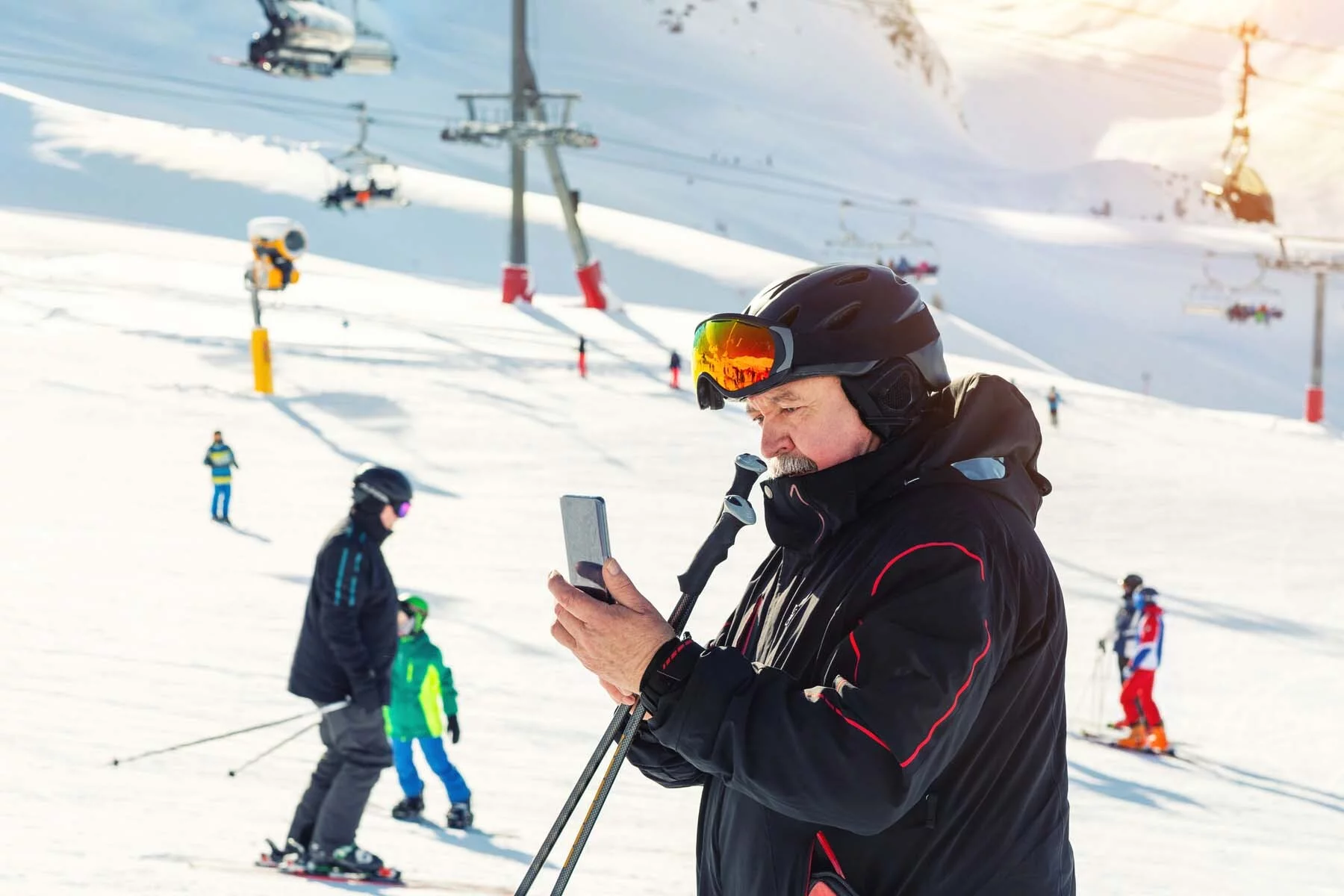If you’re an expat living in Austria, you’ll want to stay connected with friends and family wherever they are in the world. Thankfully, the country has a good-quality mobile network with decent 4G coverage, particularly in the larger cities like Vienna. It also has an ever-growing number of mobile operators with excellent SIM and contract options for expats and visitors.
Despite there being fewer than 10 million residents in Austria, the country’s mobile phone market is increasingly competitive. This has led local operators to get innovative with their offerings and create a range of affordable options. But with so much choice available, expats moving to Austria can find getting a SIM card confusing. To help get you set up, this guide provides the following information:
The mobile network in Austria
As you would expect from a country located in the heart of Europe, Austria has a high-quality mobile network that lets expats and visitors connect easily. Like other European countries, Austria uses the GSM network for its mobile communications. This means that most new arrivals will find connecting to the local network relatively straightforward. However, even if you’re coming from a country that uses the alternative CDMA network, your smartphone should still work in Austria.

Austria has a relatively well-developed 4G network, with a decent majority of the country enjoying 4G or 4G+ connectivity. However, coverage can vary substantially between regions and operators. This is particularly true in the largely mountainous southern and western parts of the country, You should still be able to access 2G or 3G in these areas, although it can be temperamental. In larger cities, including Vienna, Graz, and Klagenfurt, you’ll be able to access local 5G networks.
Wi-Fi connectivity in Austria
If you’re looking for public Wi-Fi, you’ll find plenty of free hotspots throughout the country. These are largely concentrated in more heavily-touristed areas, including Salzburg, Vienna, and Innsbruck. You may also find free Wi-Fi at some libraries, museums, and transit hubs. If you’re looking to set up Wi-Fi at home, read our guide to setting up internet, phone home, and TV in Austria.
Can I use my mobile phone in Austria?
If you’re arriving in Austria from a country that uses the GSM network, you shouldn’t have too much trouble connecting your mobile phone (handy). However, even if you’re arriving from a country on the CDMA network – including Japan, Canada, and parts of the US – many modern smartphones will still be able to connect. That said, be sure to check your options before you travel to avoid any unforeseen disappointments.
If you can’t connect to the local Austria network, you might want to consider buying a cheap mobile phone on arrival. These cost around €30 and are fairly basic, enabling only calls and SMS messages. However, if you want to get a prepaid Austrian SIM card, you’ll need to complete the registration process. To avoid this, you might want to consider buying a SIM card from another EU country and using free-roaming while in Austria. Alternatively, you can pick up a world phone before traveling.

If you’re relocating to Austria – or, at the very least, planning a longer stay – you’ll probably want to consider buying an Austrian SIM card or signing up for a local mobile contract. Getting a SIM card will be the cheapest option in terms of up-front costs but remember you’ll need to register. Thankfully, whichever you choose, you have plenty of Austrian mobile operators to choose from. Some of these operators also provide home internet and TV packages, so be aware of any bundle discounts.
Austrian mobile operators
The Austrian mobile phone sector is surprisingly competitive, with a number of operators vying for your custom. There are three main Austrian operators, each with their own network. These are A1, 3 (Drei), and Magenta (formerly T-Mobile). In addition, there are a growing number of MVNOs (mobile virtual network operators) that use these three main networks. Therefore, it pays to shop around to see what’s out there. It’s also a good idea to think about any other services you might need, such as home internet and TV, to see if you can receive any discounts.
Mobile operators in Austria include:
- 3 (Drei)
- A1
- bob
- Magenta
- Red Bull Mobile
In terms of subscribers, A1 Telekom has the biggest market share of Austrian mobile operators. The successor to the former state-owned telecoms operator, PTV, has over 35% of the market. This is followed by Magenta Telekom (32%) and 3 (24%). Beyond these three, there are a growing number of MVNOs to choose from, but these don’t typically offer as much coverage in rural areas. In towns and cities, however, they often have equal coverage for cheaper prices.
If your phone is unlocked and compatible with the Austrian mobile network, you can choose the mobile operator of your choice. However, if your previous operator has a presence in Austria, you may want to stay with the same provider.
Prepaid vs mobile contracts
As in many other countries, if you’re choosing a mobile phone connection in Austria you have two options: a prepaid SIM card or a mobile phone contract. Prepaid SIMs are generally the quickest and easiest way to get yourself a local phone number without the commitment of a contract. You should consider getting a prepaid SIM if you need a quick and simple way to make calls, send SMS messages, and use mobile data.
The alternative to an Austrian SIM card is taking out a mobile phone contract. This will typically mean you end up paying less for calls, texts, and data, especially if you use your phone a lot. They can also be a good choice if you’re looking for the latest smartphone. Contracts are a great option if you’re planning to stay in Austria for an extended period, too. This is because contracts tend to be 12 months or, more commonly, 24 months.
Mobile contracts in Austria
Mobile phone contracts in Austria include a certain amount of call minutes, text messages, and mobile data allowance for a fixed monthly fee. The cost of your monthly payments will depend on your chosen tariff, so make sure you choose the right option for your usage. Remember that you can often get discounts on your mobile phone payments should you take out home internet or TV packages with the same operator. These packages are available from a number of providers.

Austrian phone contracts are either SIM-only or include a handset. Some operators offer no commitment (ohne bindung) contracts, which can be canceled at any time. Typically, many contracts are 24 months in length, although some are shorter. Make sure you read the small print on contract length before signing up, particularly if you’re not planning to stay in Austria for more than a year. You will likely need to pay a small, one-off activation fee when setting up your contract. Fees are typically paid monthly by direct debit, so you’ll need to provide your local bank account details when signing up.
How to get a mobile phone contract in Austria
Signing up for an Austrian mobile plan is relatively straightforward for expats. You can either do it online or by visiting the local retail outlet of your preferred operator. You’ll find the three main operators have stores in most Austrian towns and cities. However, you’ll likely need to sign up for an MNVO operator online. If you visit a store, bear in mind that shop assistants may not speak English. Therefore, you might need to brush up on your German.
To sign up for a mobile contract, you’ll need the following:
- proof of identity (passport)
- proof of Austrian address (such as registration certificate, or Meldebestätigung)
- Austrian bank account details
If you don’t have an Austrian bank account, it’s a good idea to open one as these can be extremely useful to have when living in the country. Visit your nearest retail bank, or sign up with a mobile bank operating in Austria, such as N26.
Austrian SIM cards
Prepaid SIM cards provide more freedom than lengthier mobile contracts for expats arriving in Austria. However, they are typically more expensive for calls, SMS messages, and mobile data. This makes them a great option if you don’t use your phone much. They’re also a good idea if you’re not staying in Austria for the longer term. However, be aware that you will need to register your new SIM card in Austria. This can be done using your proof of identity, such as your passport.
With so many operators to choose from, you have plenty of options in Austria when selecting a SIM card. They can be picked up from a number of resellers, including telecom shops and supermarkets. You can also order them online, although you will still need to register as part of the activation process. Some operators also offer eSIMs for a greater level of flexibility. Mobile credit can be added online via an app or through top-ups brought at selected retailers. These are typically available at intervals of €5 or €10.

Alternatively, an increasing number of operators offer prepaid tariffs – or contracts without commitment. These tariffs let you pay a fixed amount every month for a certain allowance of minutes, SMS messages, and mobile data. These are generally more expensive than phone contracts but, unlike mobile plans, there’s no contract; you can simply cancel monthly. This makes these prepaid tariffs a good option for expats looking for more flexibility.
Austrian mobile phone numbers
Compared to many other European countries, understanding the local phone numbering system in Austria can be confusing for expats. Typically, mobile phone numbers in Austria have 11 digits, with the first four dictating the operator. However, as numbers can now be moved easily by the user, this is no longer necessarily correct.
Non-mobile phone numbers can vary in length, with most being either nine or ten digits long. Cities have their own local dialing codes, which are included at the start of the number. For example, Vienna is 01 and Graz is 0316. This varies the length of the phone number.
When dialing an Austrian number from outside the country, you’ll need to add the country’s international dialing code. This is 0043 or +43. You then omit the initial 0 from the phone number.
Repairing a mobile phone in Austria
Has your mobile phone fallen from your pocket during a wander around Vienna? Or maybe it’s been scratched during a hike through the breathtaking Austrian Alps? Whatever your reason, if you’re looking for mobile phone repairs in Austria you have plenty of options. Some operators will be able to provide in-store repair services at their outlets. Certain manufacturers, such as Apple, offer these services in-store. However, you’ll also find phone repair shops in most towns. Look online for your nearest phone shop that can provide repairs.
Making a complaint about an Austrian mobile operator
Every mobile operator in Austria will have its own complaints process. You should use this process if you have any problems or feel that the service has not been what you expected. You’ll be able to find this information easily on their website. However, should you want to complain about the operator itself, you can do so by contacting Austria’s RTR (Rundfunk und Telekom Regulierungs), the country’s media and telecoms regulator. Through the agency, you’ll be able to submit your complaint along with any relevant supporting documents.
Useful resources
- RTR (Rundfunk und Telekom Regulierungs) – Austria’s telecoms regulator






